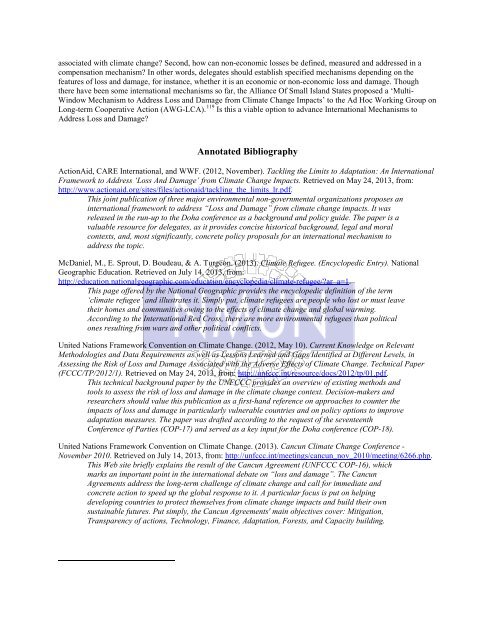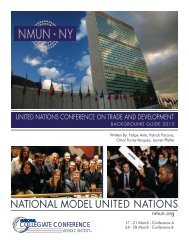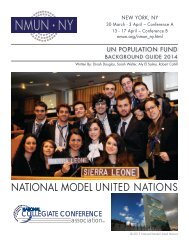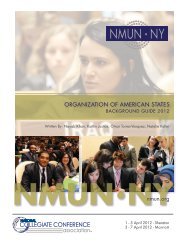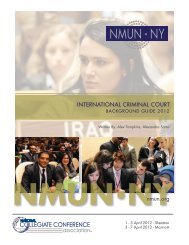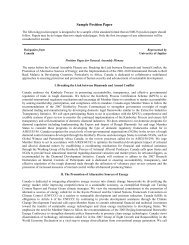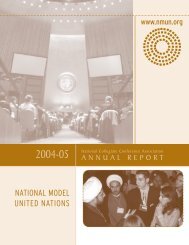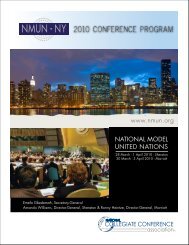NMUN • KOREA - National Model United Nations
NMUN • KOREA - National Model United Nations
NMUN • KOREA - National Model United Nations
Create successful ePaper yourself
Turn your PDF publications into a flip-book with our unique Google optimized e-Paper software.
associated with climate change? Second, how can non-economic losses be defined, measured and addressed in a<br />
compensation mechanism? In other words, delegates should establish specified mechanisms depending on the<br />
features of loss and damage, for instance, whether it is an economic or non-economic loss and damage. Though<br />
there have been some international mechanisms so far, the Alliance Of Small Island States proposed a ‘Multi-<br />
Window Mechanism to Address Loss and Damage from Climate Change Impacts’ to the Ad Hoc Working Group on<br />
Long-term Cooperative Action (AWG-LCA). 119 Is this a viable option to advance International Mechanisms to<br />
Address Loss and Damage?<br />
Annotated Bibliography<br />
ActionAid, CARE International, and WWF. (2012, November). Tackling the Limits to Adaptation: An International<br />
Framework to Address ‘Loss And Damage’ from Climate Change Impacts. Retrieved on May 24, 2013, from:<br />
http://www.actionaid.org/sites/files/actionaid/tackling_the_limits_lr.pdf.<br />
This joint publication of three major environmental non-governmental organizations proposes an<br />
international framework to address “Loss and Damage” from climate change impacts. It was<br />
released in the run-up to the Doha conference as a background and policy guide. The paper is a<br />
valuable resource for delegates, as it provides concise historical background, legal and moral<br />
contexts, and, most significantly, concrete policy proposals for an international mechanism to<br />
address the topic.<br />
McDaniel, M., E. Sprout, D. Boudeau, & A. Turgeon. (2013). Climate Refugee. (Encyclopedic Entry). <strong>National</strong><br />
Geographic Education. Retrieved on July 14, 2013, from:<br />
http://education.nationalgeographic.com/education/encyclopedia/climate-refugee/?ar_a=1.<br />
This page offered by the <strong>National</strong> Geographic provides the encyclopedic definition of the term<br />
‘climate refugee’ and illustrates it. Simply put, climate refugees are people who lost or must leave<br />
their homes and communities owing to the effects of climate change and global warming.<br />
According to the International Red Cross, there are more environmental refugees than political<br />
ones resulting from wars and other political conflicts.<br />
<strong>United</strong> <strong>Nations</strong> Framework Convention on Climate Change. (2012, May 10). Current Knowledge on Relevant<br />
Methodologies and Data Requirements as well as Lessons Learned and Gaps Identified at Different Levels, in<br />
Assessing the Risk of Loss and Damage Associated with the Adverse Effects of Climate Change. Technical Paper<br />
(FCCC/TP/2012/1). Retrieved on May 24, 2013, from: http://unfccc.int/resource/docs/2012/tp/01.pdf.<br />
This technical background paper by the UNFCCC provides an overview of existing methods and<br />
tools to assess the risk of loss and damage in the climate change context. Decision-makers and<br />
researchers should value this publication as a first-hand reference on approaches to counter the<br />
impacts of loss and damage in particularly vulnerable countries and on policy options to improve<br />
adaptation measures. The paper was drafted according to the request of the seventeenth<br />
Conference of Parties (COP-17) and served as a key input for the Doha conference (COP-18).<br />
<strong>United</strong> <strong>Nations</strong> Framework Convention on Climate Change. (2013). Cancun Climate Change Conference -<br />
November 2010. Retrieved on July 14, 2013, from: http://unfccc.int/meetings/cancun_nov_2010/meeting/6266.php.<br />
This Web site briefly explains the result of the Cancun Agreement (UNFCCC COP-16), which<br />
marks an important point in the international debate on “loss and damage”. The Cancun<br />
Agreements address the long-term challenge of climate change and call for immediate and<br />
concrete action to speed up the global response to it. A particular focus is put on helping<br />
developing countries to protect themselves from climate change impacts and build their own<br />
sustainable futures. Put simply, the Cancun Agreements' main objectives cover: Mitigation,<br />
Transparency of actions, Technology, Finance, Adaptation, Forests, and Capacity building.


